Overview
In today's rapidly evolving business environment, many companies face the daunting challenge of staying relevant amid shifting digital marketing trends. This struggle can lead to feelings of uncertainty and frustration, particularly for those striving for sustainable growth. It’s crucial to recognize that adapting to these trends is not just a necessity but an opportunity for transformation.
The rise of AI for personalized marketing, for instance, offers a way to connect with customers on a deeper level, fostering loyalty and engagement. Similarly, the effectiveness of short-form video content has become a powerful tool for storytelling, allowing businesses to convey their messages in a more relatable manner. Social commerce, too, is reshaping the way consumers interact with brands, making it essential for businesses to embrace this shift.
Moreover, the necessity of ethical marketing practices cannot be overlooked. As consumers become increasingly aware of their choices, businesses that prioritize integrity will not only enhance their reputation but also build lasting relationships with their customers. By embracing these insights, companies can navigate the complexities of the digital landscape with confidence and compassion, ultimately enhancing customer engagement and loyalty.
Together, let’s explore these trends and discover how they can empower your business to thrive in an increasingly competitive world.
Introduction
In a time when digital transformation is unfolding at an extraordinary speed, many businesses find themselves grappling with the necessity to adapt or face the risk of becoming obsolete. This challenge can feel overwhelming, especially as marketing strategies continuously evolve. The stakes are high, and understanding the latest trends is essential for companies wishing to connect authentically with their audiences.
This article explores ten pivotal digital marketing trends that are shaping the future of business, offering insights into how organizations can harness these trends to foster deeper engagement and growth. However, with a multitude of options at their disposal, how can businesses discern which strategies will genuinely resonate with their customers and lead to sustainable success?
Together, we can navigate this landscape and uncover the paths that will truly make a difference.
RNO1: Pioneering Digital Experiences with AI Integration
In today's fast-paced digital world, many businesses struggle to connect with their customers meaningfully. This disconnect can lead to frustration and missed opportunities, especially for tech startup founders who are eager to establish their brands. As they navigate this evolving landscape, the need for effective communication and engagement becomes more crucial than ever.
RNO1 understands these challenges deeply. By incorporating AI technologies into its promotional strategies, RNO1 offers a solution that not only personalizes customer interactions but also empowers businesses to make informed, data-driven decisions. Imagine being able to analyze buyer behavior patterns effortlessly—this capability allows brands to tailor their marketing efforts with precision, enhancing user experiences and significantly boosting engagement and conversion rates.
What sets RNO1 apart is its unwavering commitment to achieving the right outcomes. The focus on performance approaches ensures that success is not just a goal but a quantifiable reality. As we look toward the future, particularly in 2025, marketing digital trends are essential for businesses aiming for sustainable growth and a competitive edge.
Furthermore, RNO1 prioritizes clear communication and collaborative project management, which helps to prevent scope creep. This dedication reinforces its role as a strategic partner in digital growth, fostering a nurturing environment where businesses can thrive. Together, we can and build a brighter future for your brand.
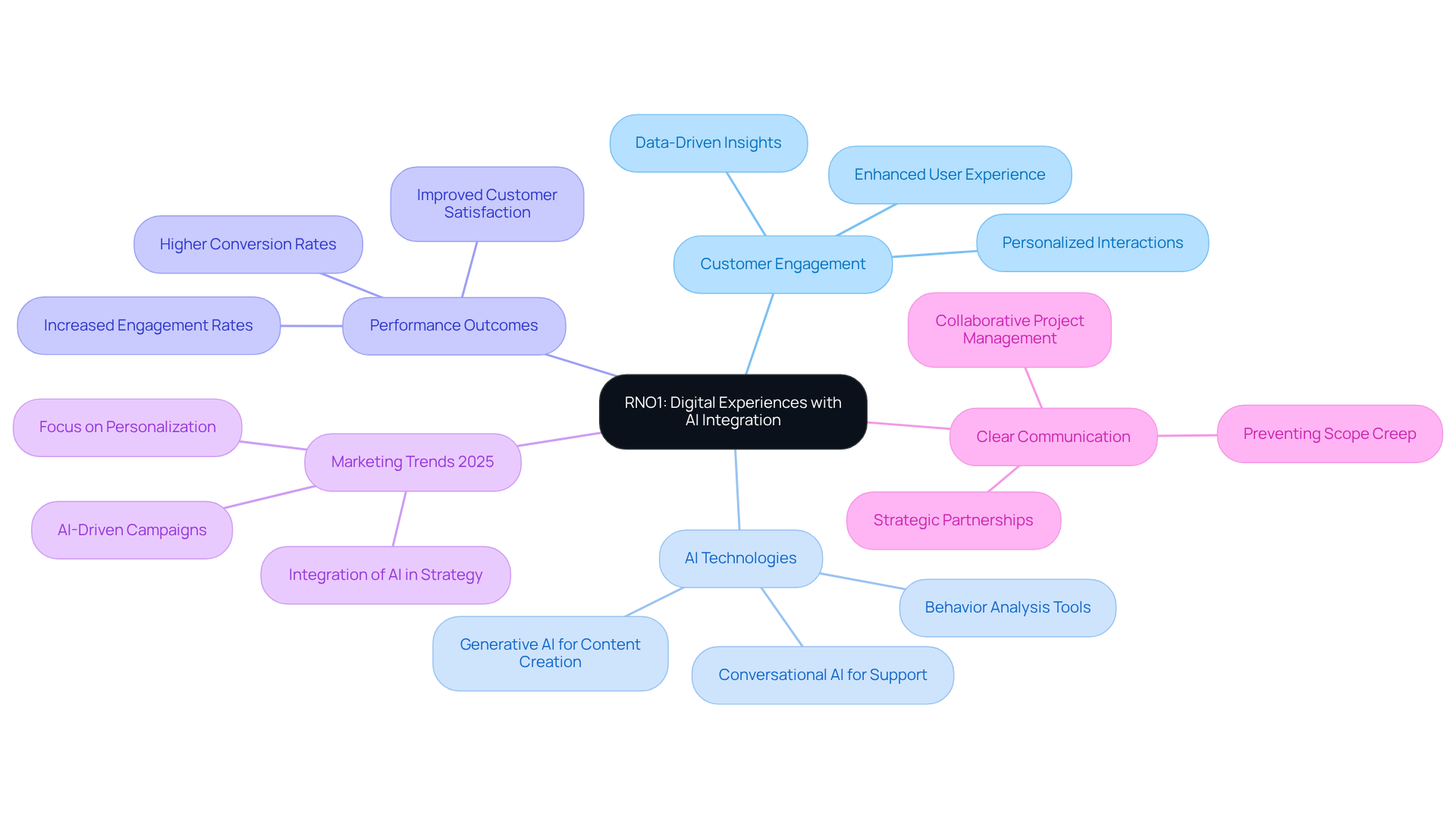
Artificial Intelligence: Transforming Marketing Strategies and Customer Engagement
In today's fast-paced world, many tech startup founders face the challenge of effectively engaging customers amidst overwhelming competition. This struggle can lead to frustration, as traditional marketing methods often fall short in capturing attention and fostering loyalty. However, there is hope in understanding marketing digital trends.
Artificial Intelligence is fundamentally transforming marketing approaches by automating processes, analyzing extensive datasets, and accurately forecasting buyer behavior. By 2025, AI tools are expected to play a pivotal role in personalizing content and optimizing ad placements, significantly enhancing customer service through advanced chatbots.
For instance:
- 58% of retail marketers indicate enhanced customer loyalty via AI, especially in retention strategies.
- 66% leverage AI to predict future consumer behavior, enabling proactive engagement.
- 47% of US retail marketers report increased customer loyalty through AI, underscoring its broad impact across sectors.
As brands adopt marketing digital trends, they can craft more engaging and relevant experiences, leading to a notable increase in customer loyalty and sales. Notably, 80% of routine customer inquiries are manageable by AI chatbots, showcasing their effectiveness in customer service.
A case study on increased customer engagement through AI illustrates how retail marketers are utilizing AI to make communications more relevant and timely, resulting in higher engagement metrics.
To effectively in your promotional strategies, consider starting with small-scale pilot projects. This approach allows you to test and refine your strategy in a nurturing environment before a full rollout, ensuring that your efforts resonate with your audience and foster lasting connections.
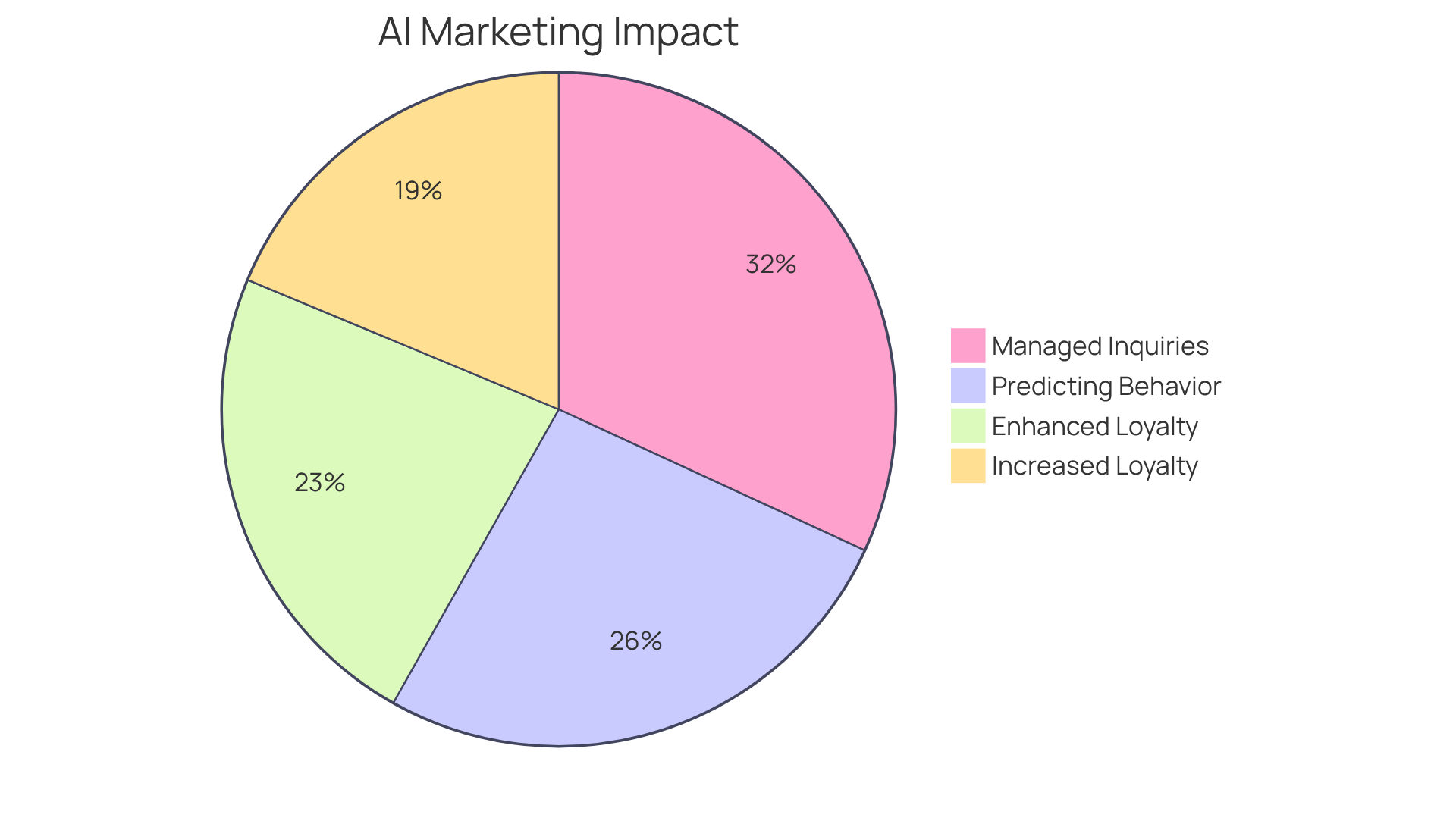
Short-Form Video Content: Engaging Audiences in a Fast-Paced Digital World
In today's fast-paced digital world, businesses often struggle to connect meaningfully with their audiences. Short-form video content has emerged as a vital solution, with platforms like TikTok and Instagram Reels leading the charge. These platforms empower companies to share concise, engaging messages that resonate with viewers who are increasingly drawn to quick, captivating content. By embracing short-form videos, businesses can enhance their storytelling, effectively showcase their products, and foster genuine interactions with their audience.
As we look ahead to 2025, a significant 89% of businesses are anticipated to harness video in line with marketing digital trends. Projections suggest that short-form video content will capture a remarkable 90% of internet traffic. This engaging format not only captivates viewers but also encourages sharing, amplifying visibility across social networks. It's heartening to note that 89% of individuals express a desire for more video content from companies, underscoring the growing demand for compelling visual narratives.
Brands that are successfully leveraging TikTok and Instagram Reels are witnessing impressive engagement rates. For instance, users spend an average of 52 minutes daily engaging with TikTok videos, while Instagram Reels account for half of the time spent on the app. This trend illustrates how effectively these platforms drive audience engagement and foster customer loyalty, highlighting important marketing digital trends.
Industry specialists emphasize the importance of these platforms:
"When users engage with companies on TikTok, they’re most likely to interact with short-form videos, ranging from 15-60 seconds long" (2024 Sprout Social Media Content Strategy Report). This insight highlights the preference for concise content that aligns with modern consumption habits, reflecting the need for businesses to adapt.
As companies navigate the ever-evolving digital landscape, leveraging marketing digital trends like the strategic use of TikTok and Instagram Reels will be essential in capturing audience attention and fostering meaningful engagement in 2025 and beyond. Together, we can embrace these changes and create that resonate with our communities.
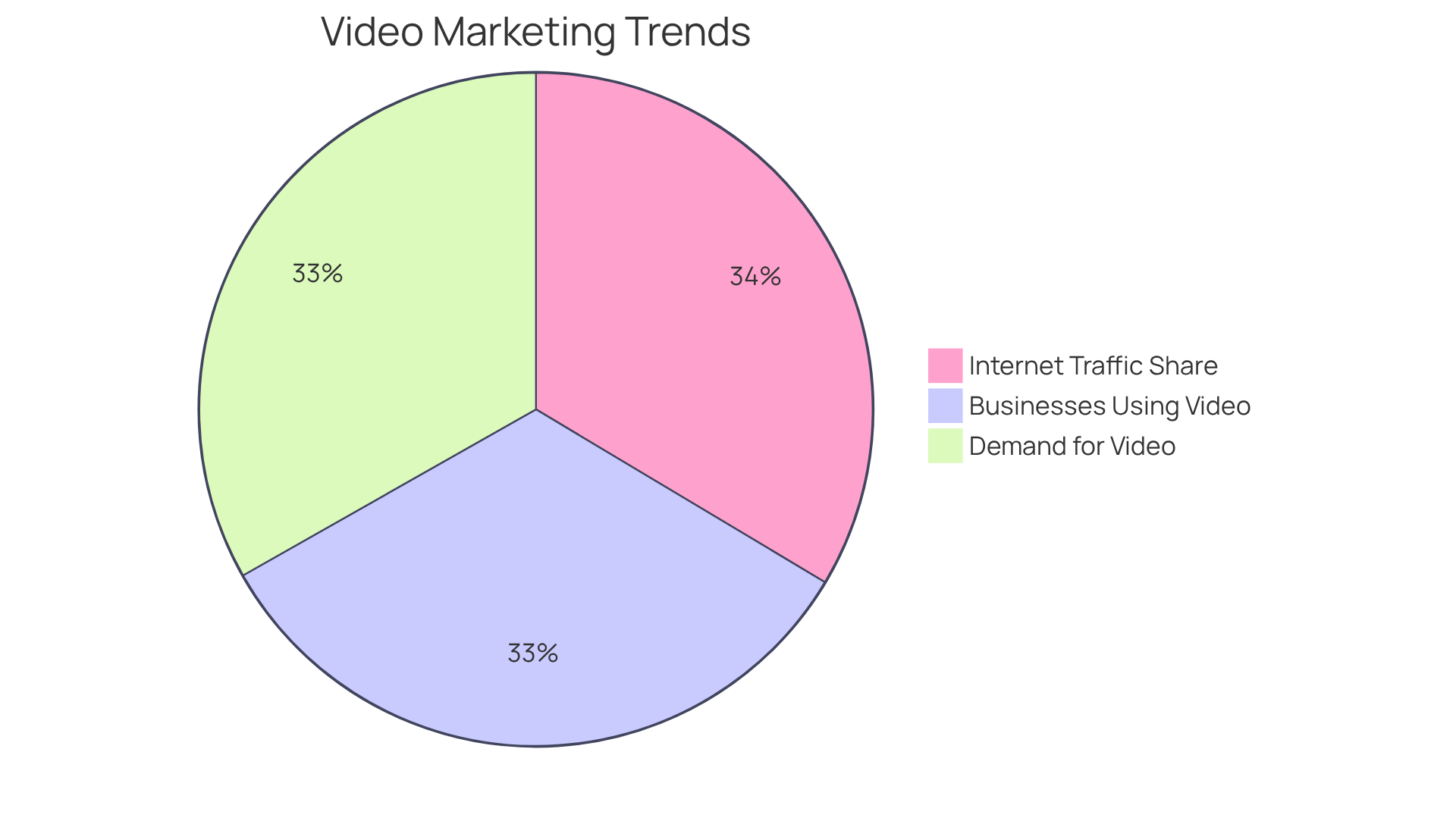
Personalization at Scale: Enhancing Customer Experience Through Tailored Marketing
Personalization at scale presents a significant challenge for many companies striving to connect meaningfully with their clients. Many businesses grapple with the reality that a lack of personalized experiences can lead to frustration for consumers. In fact, 76% of consumers express annoyance when they encounter a website that fails to offer tailored content. This highlights a pressing need for effective personalization strategies that resonate with individual preferences and behaviors.
As we look ahead to 2025, the potential for sophisticated data analysis tools to transform personalization approaches is promising. By harnessing these tools, companies can create customized experiences that align with marketing digital trends and truly reflect the needs of their audience. This not only enhances customer satisfaction but also significantly . Research shows that individuals are 38% more likely to engage with companies that personalize their offerings effectively. Moreover, 88% of marketers believe that personalization efforts contribute positively to business growth, with 89% of businesses investing in this area this year.
The financial rewards of personalization are remarkable, with personalized emails capable of increasing revenue by a staggering 760%. As the future of marketing digital trends unfolds, understanding and responding to individual client needs will be paramount. However, it’s crucial to acknowledge that 43% of companies still struggle with maintaining accurate, real-time customer data, which presents a challenge that must be addressed.
In this evolving landscape, companies that prioritize personalization are likely to see a significant rise in customer loyalty and revenue. By fostering a deeper connection with their audience through data-driven personalization, businesses can not only meet but exceed the changing expectations of their clients. This is a journey worth embarking on, and together, we can navigate the complexities of creating meaningful, personalized experiences.
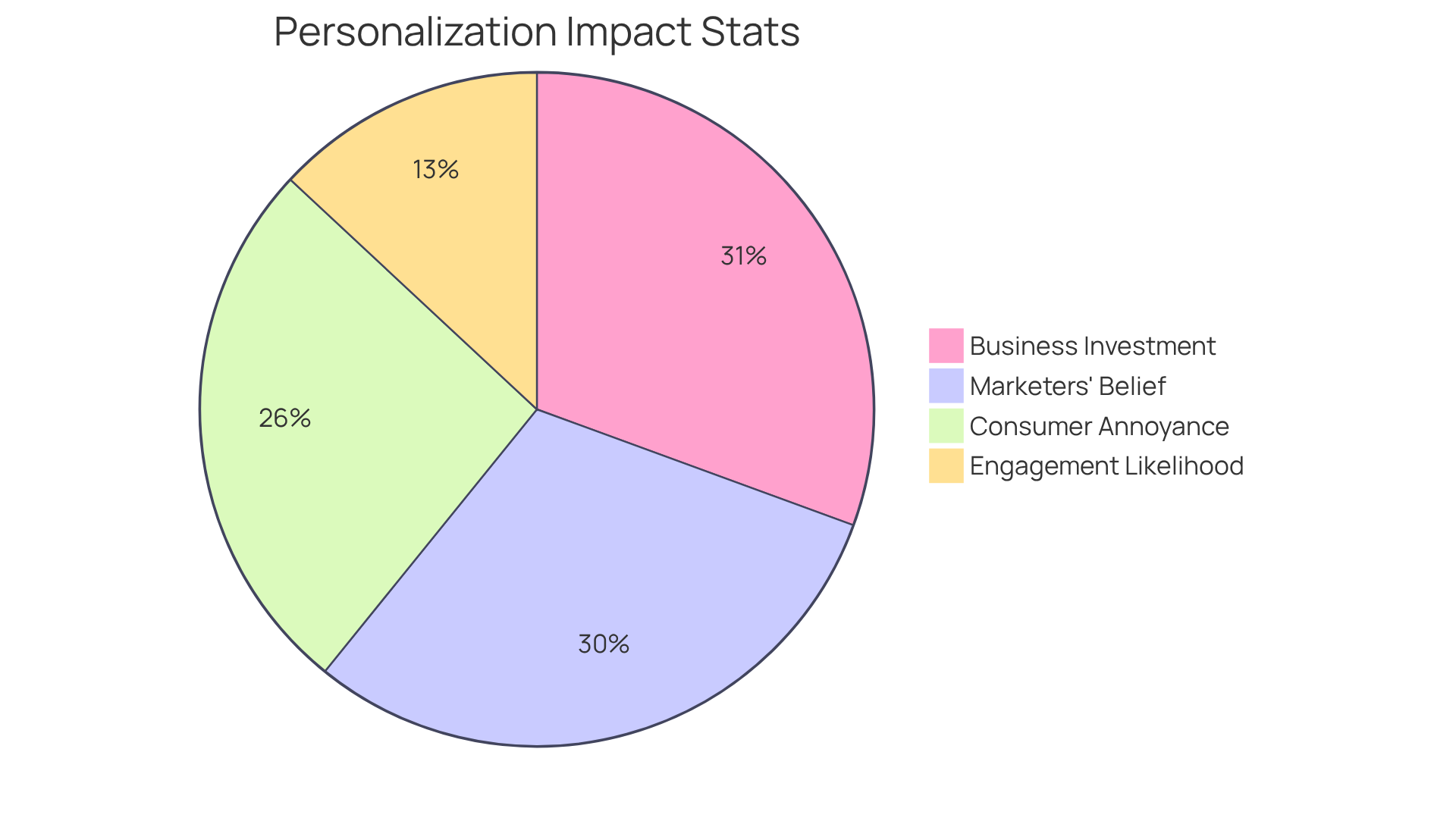
Social Commerce: Merging Shopping and Social Media for Seamless Experiences
Social commerce is transforming the shopping experience, making it easier for us to connect with brands we love. By embedding eCommerce functionalities directly within social media platforms, companies can showcase their products and facilitate purchases seamlessly. This integration not only simplifies the purchasing process but also enhances our convenience and satisfaction as customers. Looking ahead, retail social commerce sales in the U.S. are expected to exceed $100 billion by 2025, marking a significant shift in how we engage with companies online.
The power of social proof and community engagement shines through these platforms, driving sales and nurturing brand loyalty. Did you know that:
- 82% of buyers turn to social media for product discovery?
- 27% of internet users prefer finding products via social media over any other channel?
This highlights the importance of a robust social commerce strategy. Brands like GoPro have harnessed the magic of user-generated content, exemplified by their 'Million Dollar Challenge,' which inspired over 42,000 user-generated videos. Such authentic interactions can truly lead to increased sales.
As we navigate this evolving landscape, platforms like Facebook and Instagram are enhancing their eCommerce capabilities in response to marketing digital trends. Facebook is becoming the most preferred platform for 46% of shoppers, a trend that reflects our changing shopping habits. Additionally, the rise of live shopping events reflects current marketing digital trends, allowing us to interact with vendors in real-time, with Facebook Live and YouTube Live leading the way in engagement.
In this dynamic environment, RNO1's Ryde initiative offers a creative solution for scaling omnichannel ambassador programs. By fostering e-commerce engagement through influencer collaborations, RNO1 is well-positioned to leverage community-driven promotion effectively. As social media continues to evolve, it’s crucial for companies to adapt their strategies to align with marketing digital trends, ensuring they meet our shifting expectations as customers in 2025 and beyond. Together, we can embrace these changes and find new ways to .
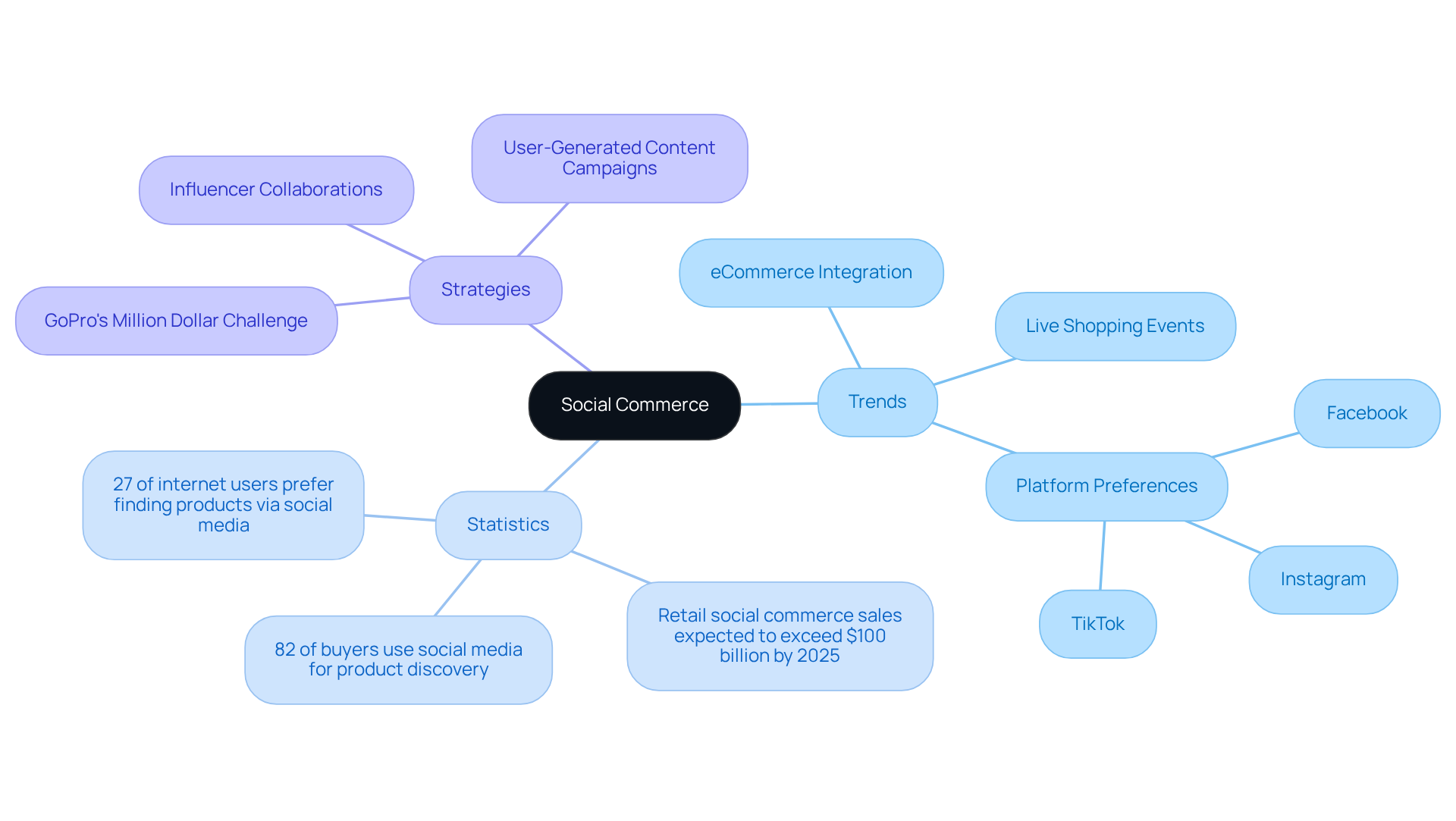
Multi-Channel Marketing: Reaching Consumers Across Diverse Platforms
In today's fast-paced digital landscape, many tech startup founders face the challenge of effectively engaging consumers across various platforms by utilizing marketing digital trends. This struggle can lead to missed opportunities and a disconnect with potential customers, making it essential to find a solution that resonates with their audience. Multi-channel marketing emerges as a powerful approach, enabling companies to connect with consumers through social media, email, websites, and mobile apps—wherever they are most active. By ensuring a consistent and cohesive message throughout these interactions, businesses can significantly enhance their visibility and foster deeper customer engagement.
Consider the implications of not embracing this strategy: companies risk losing touch with their audience, which can lead to lower conversion rates and diminished loyalty. In fact, research shows that businesses employing multi-channel approaches retain an impressive 89% of their clients, underscoring the effectiveness of this method in nurturing lasting relationships. Moreover, multi-channel customers tend to spend three times more than those who engage through a single channel, highlighting the financial benefits of a diversified marketing strategy.
As consumer behavior continues to evolve, adapting to marketing digital trends becomes crucial for startups aiming to engage effectively across various platforms and thrive in the competitive landscape of 2025. RNO1's Ryde initiative exemplifies this approach by scaling omnichannel ambassador programs that enhance e-commerce engagement through strategic influencer partnerships. This not only addresses the immediate needs of startups but also paves the way for sustainable growth.
A compelling case study further illustrates that brands effectively employing multi-channel strategies experience higher customer retention rates and enhanced engagement. By incorporating sales funnel sequences and gamification techniques, RNO1’s comprehensive method to multi-channel promotion offers startups the tools they need to succeed. Together, we can , ensuring that every interaction with your audience is meaningful and impactful.
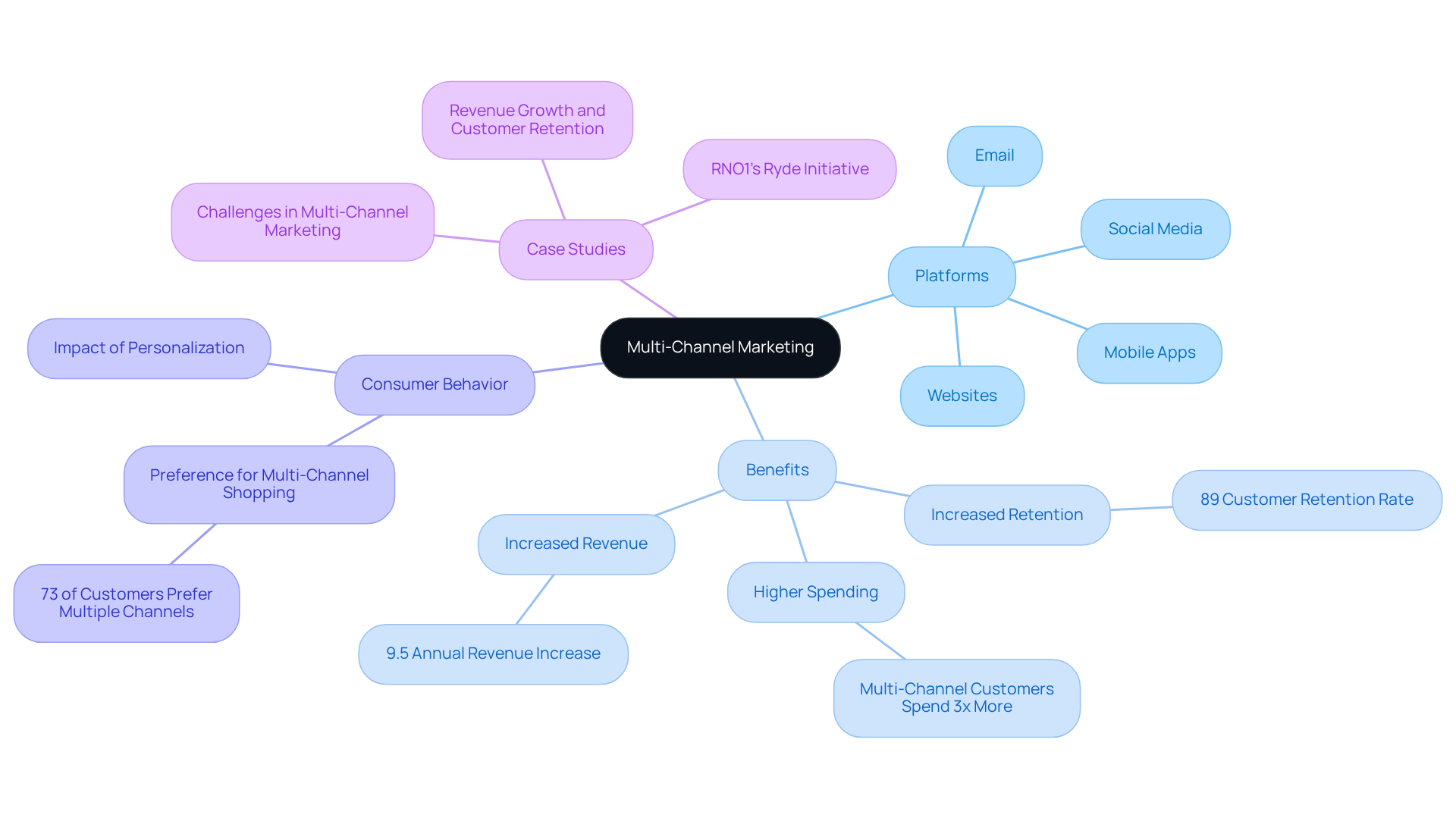
Voice Search Optimization: Adapting to the Future of Consumer Queries
Voice search optimization is becoming a vital part of digital marketing, as more consumers turn to voice-activated devices like smartphones and smart speakers. Many businesses may feel overwhelmed by the need to adapt their SEO strategies to include conversational keywords and phrases that mirror natural speech patterns. This shift is essential; around 20% of mobile searches are done via voice, and these voice-related searches are three times more likely to be local than traditional text searches.
By prioritizing voice search optimization, you can significantly enhance your visibility in search results, catering to the growing number of users who prefer voice interactions. Many successful companies are already embracing this change by incorporating long-tail conversational keywords into their content. This not only improves search rankings but also aligns closely with user intent. As Emily Reynolds points out, focusing on long-tail keywords is an effective strategy for voice search, allowing companies to capture specific queries that face less competition.
It’s crucial to enhance FAQ pages to address common voice search inquiries, as these pages play a key role in optimizing for voice search. The importance of conversational keywords cannot be overstated; they enable businesses to connect with consumers in a more relatable way, ultimately leading to better outcomes. Additionally, conversational keywords often face reduced competition compared to broad, generic terms, providing a strategic advantage for your business. As marketing digital trends continue to evolve, making voice search optimization a priority will be essential for companies striving to remain competitive and relevant in an increasingly voice-driven world.
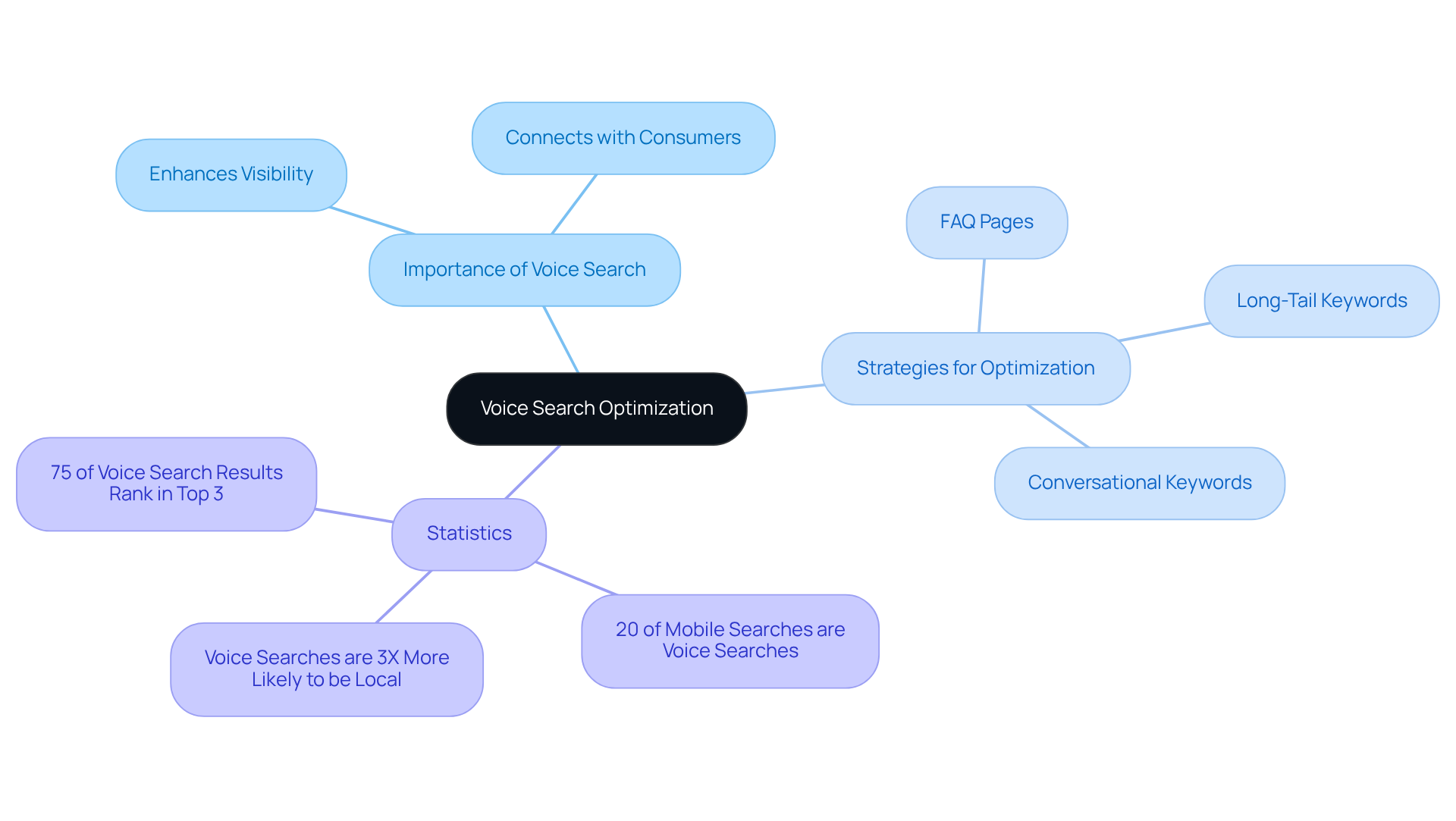
Customer Experience: Prioritizing Engagement and Satisfaction in Marketing
In today's fast-paced digital world, customer experience stands as a significant challenge for many entrepreneurs. It’s a common struggle to navigate the complexities of engaging with customers effectively. Brands like RNO1, through their thoughtful rebranding of Founder's Haven, show us that prioritizing customer engagement and satisfaction is not just a strategy; it’s a pathway to building loyalty and encouraging repeat business. By truly understanding the journeys of their customers and addressing their pain points, RNO1 has fostered meaningful interactions that resonate deeply with their audience, especially within the tech startup sector.
Their collaborations, including partnerships with EOS Network Foundation and various creative companies, highlight how transformative marketing digital trends and user experience design can significantly enhance customer interactions. This focus on nurturing relationships not only elevates a company's reputation but also lays the groundwork for long-term success. It’s essential for startups to embrace marketing digital trends in their promotional efforts, creating an environment where customers feel valued and understood. Together, we can navigate these challenges, turning them into .
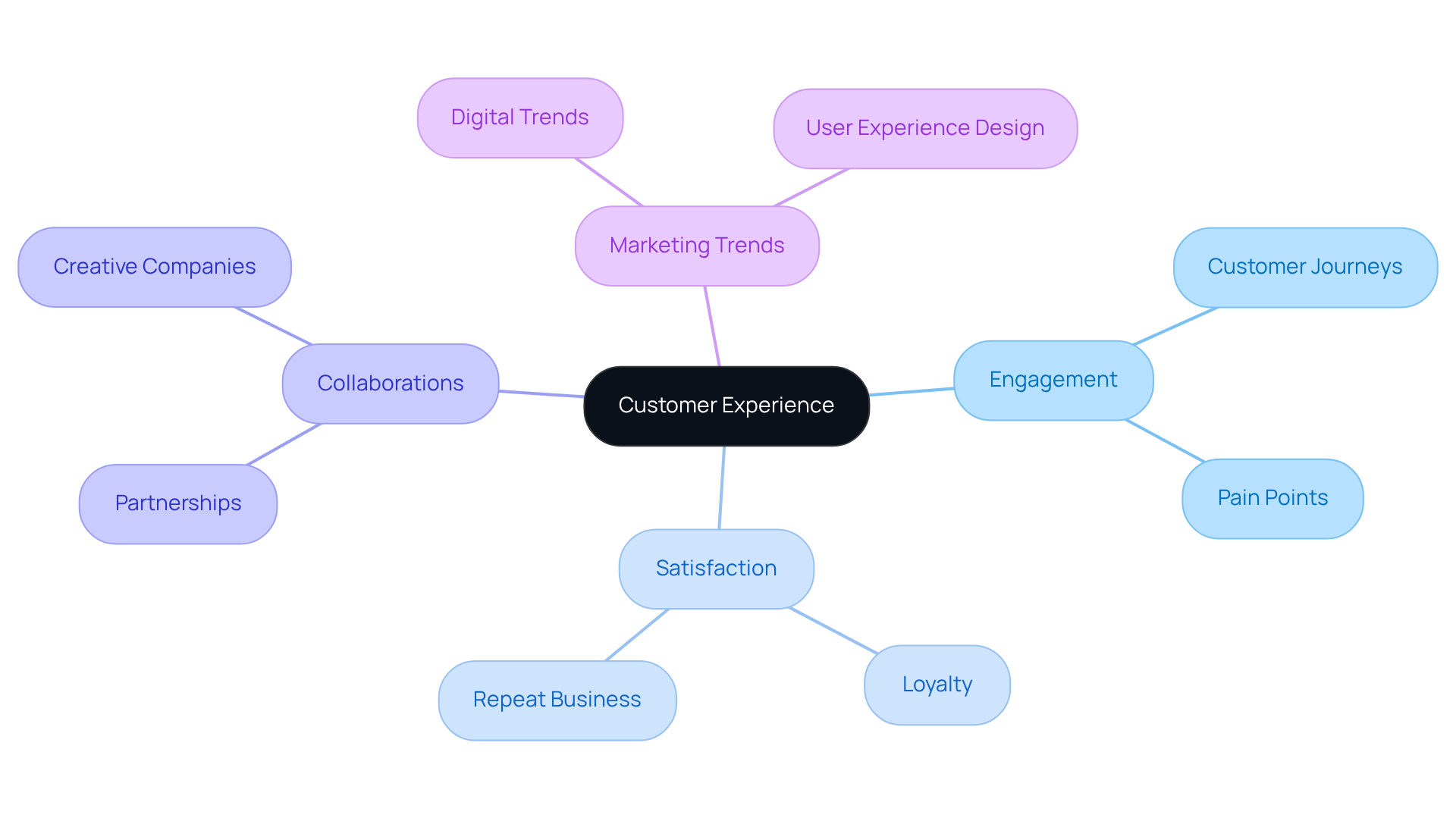
Ethical Marketing: Building Trust Through Transparency and Responsibility
In today's world, ethical marketing has become increasingly vital as consumers yearn for transparency and responsibility from the brands they support. Many companies face the challenge of navigating this expectation, which can often feel overwhelming. However, those that embrace ethical practices—like sustainable sourcing and honest advertising—can cultivate a nurturing environment of trust and loyalty among their audience. Research reveals that a remarkable 94% of shoppers are more inclined to remain loyal to companies that offer full transparency, while 63% prefer to buy from organizations committed to sustainability. Furthermore, 75% of shoppers express a greater willingness to engage with companies that openly share how their products are made.
By clearly articulating their values and commitments, companies can shine brightly in a crowded marketplace, fostering deeper connections with their customers. Take, for instance, Patagonia's 'Footprint Chronicles' initiative, which beautifully illustrates how sharing detailed insights into supply chain practices can resonate with environmentally conscious consumers. This approach has led to a reported 30% increase in sales during 2020, showcasing the power of transparency.
Looking ahead to 2025, companies that wholeheartedly embrace transparency will not only enhance their credibility but also cultivate a loyal customer base that champions their mission. This demonstrates that transparency is not merely a moral imperative but a in nurturing lasting relationships. Yet, it is essential for companies to remain mindful of the potential risks associated with transparency, such as competitive disadvantages and the heightened scrutiny of business practices. By navigating these challenges with care, businesses can truly thrive while making a positive impact.
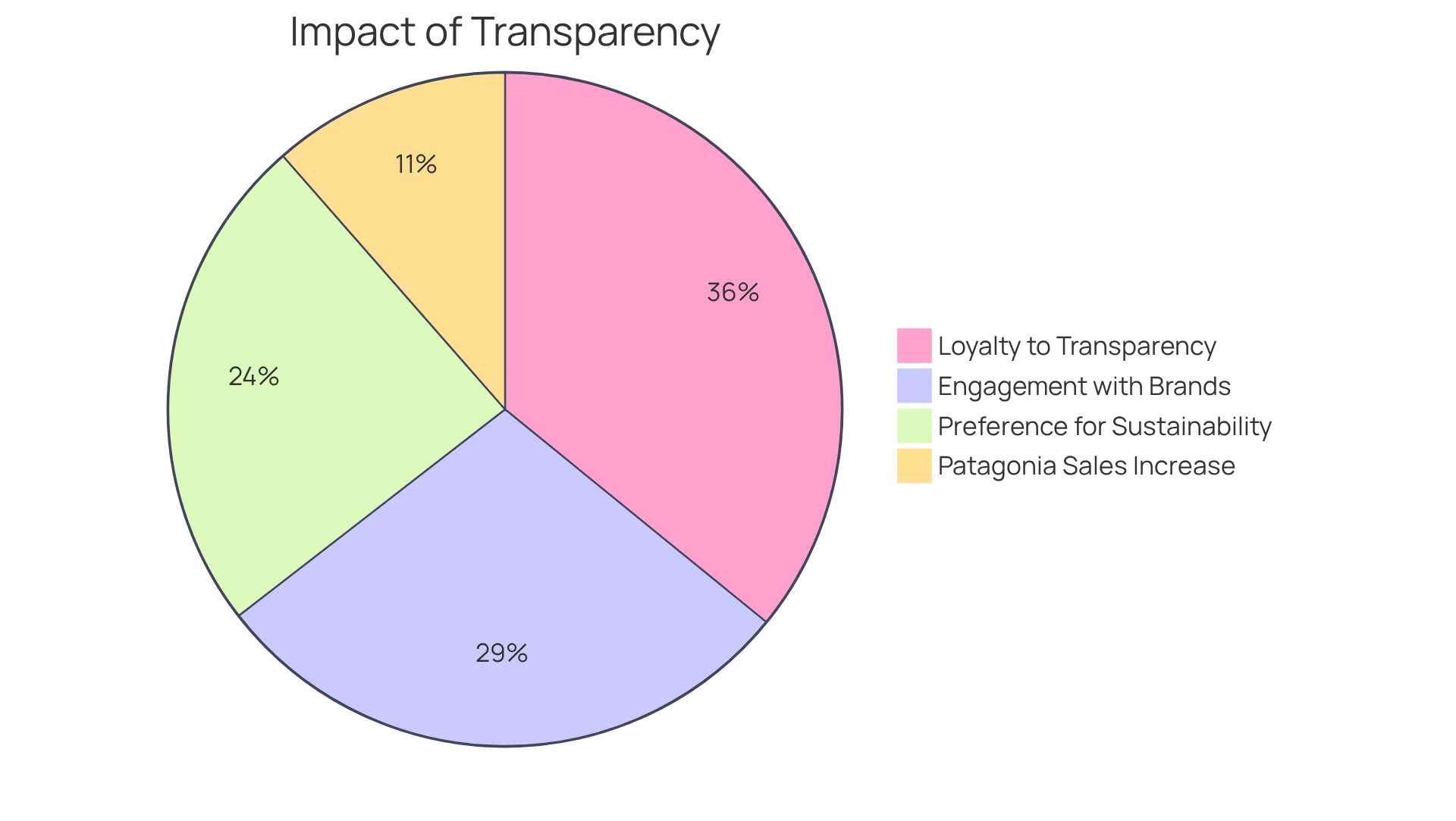
Influencer Marketing: Leveraging Authentic Voices to Connect with Consumers
In today's fast-paced world, many companies struggle to forge genuine relationships with their customers. This challenge can lead to feelings of disconnect and missed opportunities for meaningful engagement. However, influencer marketing offers a nurturing solution. By collaborating with influencers who share their values and resonate with their target audiences, companies can tap into established trust and credibility. This not only enhances visibility but also fosters authentic engagement, as individuals are far more likely to respond positively to recommendations from trusted figures within their communities.
Consider this: according to Sprout Social, 63% of consumers are inclined to purchase products endorsed by influencers they trust. This statistic underscores the profound impact that genuine voices have on consumer engagement. As businesses increasingly prioritize long-term partnerships with influencers, they can cultivate deeper relationships that enhance customer loyalty and drive sales. This is especially crucial as we look toward 2025, when the influencer promotion sector is projected to reach $32.55 billion, a significant leap from $21.1 billion in 2023.
Furthermore, 62% of creators express a preference for long-term partnerships over other campaign types, highlighting the importance of building authentic relationships. RNO1's Ryde initiative exemplifies innovative strategies for expanding omnichannel ambassador programs, with a strong emphasis on community involvement and influencer marketing. By refining luxury funnel messaging, developing thoughtful sales funnel sequences, and curating user-generated content, RNO1 effectively drives campaign virality and nurtures a robust influencer ecosystem.
As companies navigate the evolving digital landscape and marketing digital trends, it is vital to prioritize authenticity and align with influencers who genuinely embody their brand ethos. Implementing structured onboarding strategies for influencers will not only facilitate smoother collaborations but also empower companies to achieve sustainable growth. Together, we can embrace this journey of , fostering a community where both brands and influencers thrive.
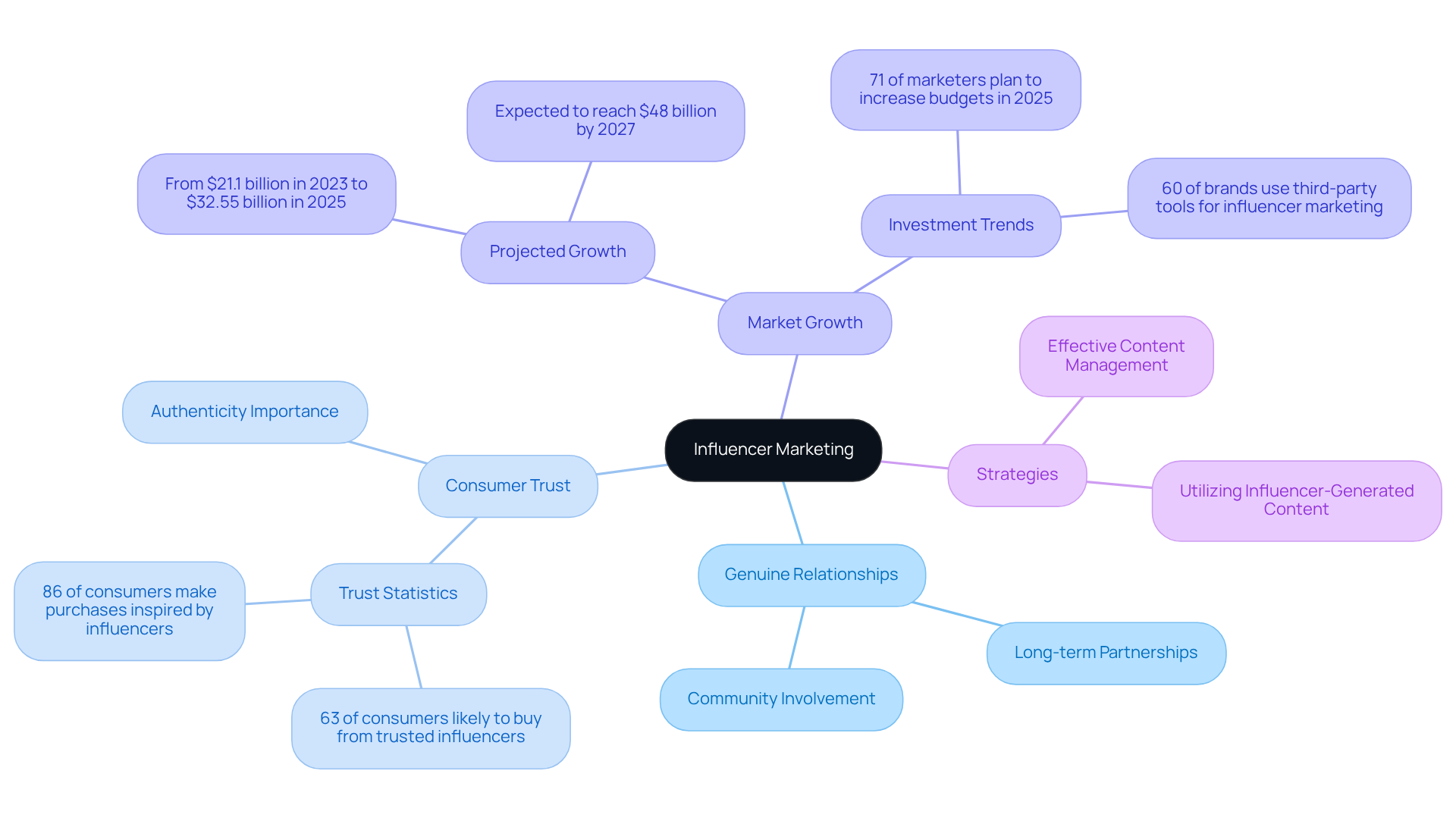
Conclusion
As we navigate the ever-changing landscape of digital marketing, it’s essential to recognize the challenges businesses face in striving to thrive in 2025 and beyond. The rapid integration of AI technologies, the surge of short-form video content, and the growing emphasis on personalization can feel overwhelming. Yet, these trends are not just obstacles; they are opportunities for growth. By embracing these advancements, companies can enhance customer engagement, streamline their strategies, and forge meaningful connections with their audiences.
Throughout this journey, we've explored various strategies that highlight the importance of multi-channel marketing, the transformative power of social commerce, and the necessity of ethical marketing practices. Each of these trends plays a vital role in nurturing customer loyalty and driving sales. Brands that prioritize voice search optimization and influencer marketing will find themselves better equipped to meet the evolving expectations of consumers, ensuring they remain relevant in a competitive market.
Ultimately, we cannot overstate the significance of adapting to these digital marketing trends. By staying informed and agile in their approach, businesses can navigate the complexities of the digital landscape while seizing opportunities for growth and connection. The future of marketing lies in understanding and responding to the needs of consumers, fostering an environment where trust, engagement, and authenticity can truly flourish. Together, let’s embrace these changes with open hearts and minds, ensuring a brighter future for all.
Frequently Asked Questions
What challenges do tech startup founders face in customer engagement?
Tech startup founders often struggle to connect meaningfully with their customers due to overwhelming competition and traditional marketing methods that may fall short in capturing attention and fostering loyalty.
How does RNO1 utilize AI in its promotional strategies?
RNO1 incorporates AI technologies to personalize customer interactions and empower businesses to make informed, data-driven decisions by analyzing buyer behavior patterns.
What are the expected benefits of AI tools in marketing by 2025?
By 2025, AI tools are expected to enhance customer service through advanced chatbots, personalize content, optimize ad placements, and significantly improve customer loyalty and engagement.
What statistics highlight the impact of AI on customer loyalty in retail?
58% of retail marketers report enhanced customer loyalty via AI, 66% leverage AI to predict future consumer behavior, and 47% of US retail marketers indicate increased customer loyalty through AI.
What role does short-form video content play in digital marketing?
Short-form video content, particularly on platforms like TikTok and Instagram Reels, allows businesses to share concise, engaging messages that resonate with audiences, enhancing storytelling and fostering genuine interactions.
What are the projections for video content usage in businesses by 2025?
By 2025, it is anticipated that 89% of businesses will utilize video in their marketing strategies, with short-form video content expected to capture 90% of internet traffic.
How much time do users spend engaging with TikTok and Instagram Reels?
Users spend an average of 52 minutes daily engaging with TikTok videos, while Instagram Reels account for half of the time spent on the app.
What is the significance of concise content in modern digital marketing?
Concise content aligns with modern consumption habits, as users prefer short-form videos ranging from 15-60 seconds, making it essential for businesses to adapt their strategies to capture audience attention effectively.




